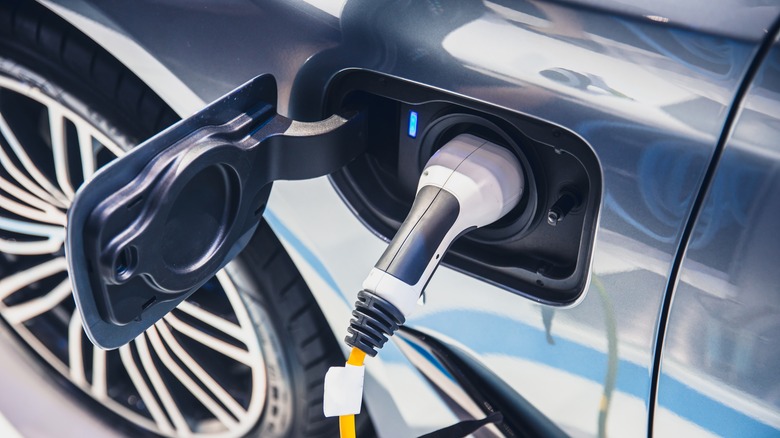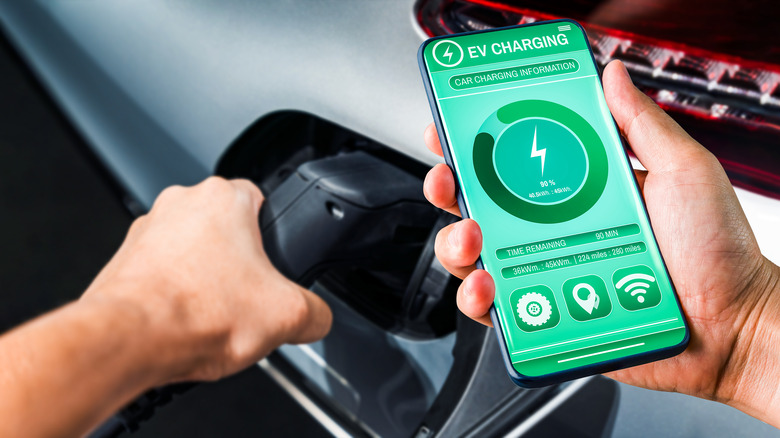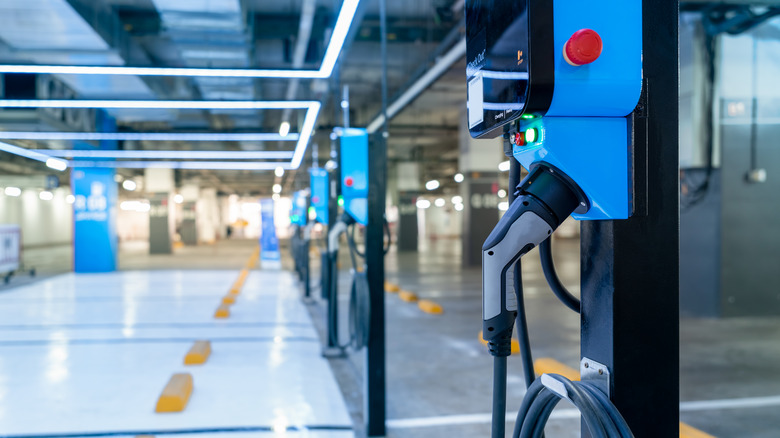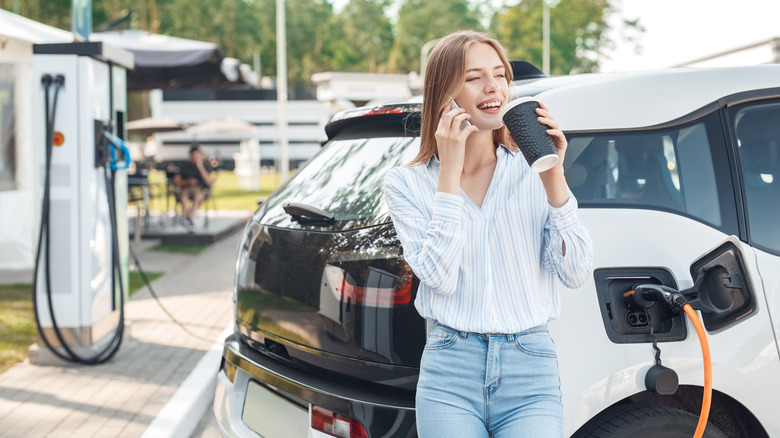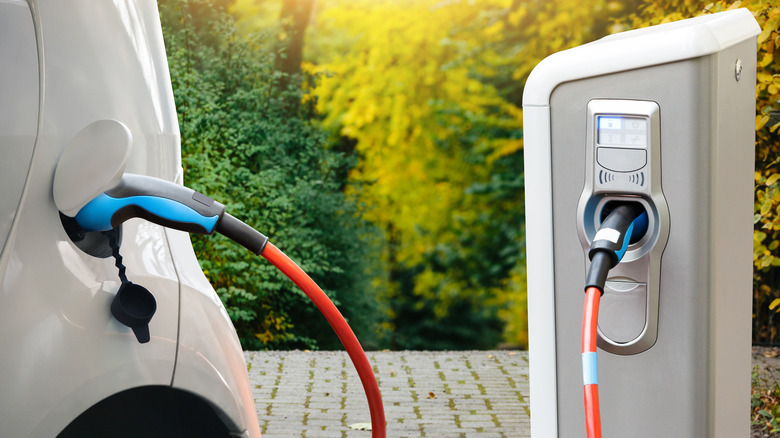How Much Does It Cost To Charge An Electric Car?
There is so much buzz about electric vehicles and the imminent shift that will probably be unavoidable in the near future. However, for anyone considering making the shift from gasoline to an electric-powered vehicle, the question of the cost of powering the car often comes up. This is an important question because of the common concern that charging a huge electrical vehicle (EV) battery will likely inflate the electricity bills significantly.
Before spending several thousands of dollars on a brand new EV, it is essential to do proper research to help you make an informed decision. It is worth mentioning that the question of how much it costs to charge an electric car is not that straightforward. This is because of some critical factors that affect the overall charging cost. Nonetheless, Investopedia details that the average cost of charging an electric vehicle on a commercial charging station ranges from $10 to $30.
Factors for cost
Unlike regular gasoline-powered vehicles with fuel economy data, electric cars can be quite different; therefore, it is vital to understand the crucial aspects that affect the cost of charging these vehicles so that you can plan accordingly. Let's break down some of these factors, as noted by Business Insider Africa.
Charging location
Right from the jump, the cost of charging your EV is calculated per kilowatt-hour. Gas prices per gallon vary from place to place, and so does the cost of charging per kilowatt-hour. In fact, the cost of charging an electric car at home is significantly less than in a public charging station.
We will need to crunch a few numbers for this to make sense. An EV travels for up to 4 miles for every kilowatt-hour of charge. Business Insider Africa details that every kilowatt-hour charge from home costs approximately 13.73 cents; therefore, covering 1000 miles per month on your electric car will cost you roughly $34 to $46. On the flip side, though, charging at commercial stations is quite expensive, with the national average standing at $10 to $30 for a full battery. The cost of charging at commercial stations also depends on the type of charger compatible with the specific brand of your car. The fast charging options cost more than their slower counterparts.
Mileage and vehicle efficiency
It is quite impressive that traveling 1000 miles will only cost you about $40. However, it is also important to mention that this cost is subject to change depending on other individual factors like the efficiency of your electric car. For example, the Tesla Model Y and the Audi E-Tron Quattro, with fuel efficiencies of 0.28 kWh and 0.43 kWh, respectively, will have different cost implications for the monthly electricity bill after traveling the same distance, Cars.com explains.
It is also essential to mention that the efficiency of an EV also varies depending on specific conditions, for instance, temperature and the size of the load on the vehicle. Furthermore, the fact that the electricity cost varies from one region to another also means that the cost of charging an electric car is also subject to change depending on the location. If you are fortunate enough to live in a state where fuel is cheaper, then your monthly bill will also be relatively smaller.
The type of charger
Fast charging options like the DC fast charger that's common in most commercial charging stations offer a quick power boost to the battery in a short amount of time. However, this convenience definitely comes at an increased cost. For instance, the Tesla supercharger is much faster than your regular home charger, but the caveat is that you have to pay a premium price for this service.
Fast charging options can increase the cost of charging the batteries on the EV by two or three times. Unfortunately, there is no standard price for fast chargers for electric vehicles because of the different payment options provided by different car companies. Remember, Tesla is not the only company that manufactures EVs today. Some companies charge by the minute, while others charge by the kilowatt-hour.
Additional costs
Now that you know the main factors determining the cost of charging an electric vehicle let's talk about some other smaller aspects that usually fly below the radar. So, let's dive right in.
Upfront charges
If this is your first electric car, then your home electrical system needs to be optimized to allow you to charge your vehicle from home. Every electric vehicle purchase comes with a standard 120V level one charging circuit with a special cable that dispenses energy slowly. This basic outlet charger gives up to 6 miles of power per hour of charging. However, if this is too slow, you can upgrade to a faster 240V level two charger that gives a range of up to 40 miles for every hour of charge. You will have to pay separately for the purchase and installation of the fast charger, Business Insider Africa notes.
Charging time of day
According to Kelley Blue Book, other factors that affect the cost of electricity include the specific regions and the time of day. During peak hours, electricity prices are at their highest. Thus, the best time to load your EV's battery is at night when the electricity demand is low, and the price is fair. With a level two charger, you should be able to charge your batteries to completion overnight.
Types of electric vehicle charging systems
With the increased popularity of electric cars, many people are also becoming aware of the Electrical Vehicle Supply Equipment (EVSE), commonly referred to as the electric vehicle charger. Charging an EV requires knowledge of the different charger types and how they influence price and charging time. Here are the popular options according to Forbes:
Level one charging
The level one charger is the smallest option currently on the market. It is compatible with the regular 120V home output. Not only is it the smallest option available, but it is also one of the slowest chargers giving a range of up to 5 miles for an hour of charging.
This level EVSE is compatible with most electric and hybrid vehicles; however, it is best for hybrid electric vehicles because of the vehicle's smaller battery capacity. Most EV owners find the charging process quite slow since it can take up to 30 hours to fully cover the batteries on an electric car. Nevertheless, the level one charger works well for short commutes between points A to B.
Level two charging
This is the next upgrade to the level one charger that requires up to 240V of a dedicated circuit. It is one of the popular charging systems for electrical vehicle owners because of the first charging and the fact that it can be installed at home. The level two option is also quite fast as it delivers up to a range of up to 80 miles within an hour's time.
This particular charger allows EV owners to replenish the power in their vehicles overnight because it takes about four to 10 hours to charge an EV battery fully. Of course, how fast the EV takes to charge is subject to factors like the battery size, but the level two charger is perfect for individuals with multiple errands and those who can't find time to charge their vehicles during the day.
Level three charging
Better referred to as the Direct Current Fast Charging, this is the fastest charging option available. It is quite impressive how fast this technology is, giving a range of up to 20 miles with every minute of charging.
You will not find it installed in homes because of the high voltage requirement of 480V, which is not supplied to residential properties. Other than the voltage requirements of this charger, the other reason this technology is not common is because of the cost implication. Purchase and installation are quite expensive, so making an economic case for installing it in your home will be unrealistic. Level three is ideal for commercial charging stations where quick recharging is necessary.
Why you need an electric car
Right from the onset, the reception toward electric vehicles has not been that good. However, things have drastically changed thanks to the reduction of cost, the emergence of more manufacturers, and the creation of better technology. Here are reasons why an electric car would be ideal for you, as noted by Tri-State.
For environmental purposes
In contrast to gas-powered vehicles, electric vehicles are better for the environment: They produce significantly low carbon emission gases that eventually destroy the ecosystem. Therefore, the decision to make this switch to EVs will mitigate the effects of climate change that we are dealing with by reducing the carbon footprint in the environment. Remember, taking care of the environment is a responsibility that falls in the hands of every human on earth.
The cost is getting cheaper
For a very long time, electric cars have been quite expensive to purchase. However, due to increased demand over the years, several manufacturers have come up with cheaper options. While the upfront price badge might still be higher than their gasoline counterparts, other tax incentives and rebates bring the price within reach of many consumers. Take advantage of the available tax credits that you might be eligible for.
A great driving experience
If you are the type of person that loves comfort and a good driving experience, then an electric vehicle might just be what you are looking for. They are designed with a relatively lower center of gravity that ensures the car is stable and handles better on the road.
Benefits of electric vehicles
Electric vehicles are more than vessels of transportation from point A to B. Let's look at some of the benefits detailed by DriveClean.
Save on fuel and maintenance costs
Electric vehicles are a cheaper alternative as far as fuel cost is concerned. DriveClean mentions that the cost of fueling a regular gasoline-powered vehicle is twice what you need for an EV to cover the same distance. A fully charged battery is enough to last you a day's errands. Besides saving on gas, electric cars will also save you a couple of bucks from the regular maintenance common with gasoline-powered vehicles. There are no spark plugs or oil filters to be changed.
Charge at the convenience of your home
You don't have to go anywhere in order to charge your EV because the level two type of charger is enough for you to load the car's battery overnight. You will be waking up to a fully charged vehicle that will easily last you the whole day. However, if you need an emergency recharge, there are plenty of charging stations all over the country that offer super-fast charging.
